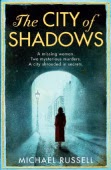Joey Driscol went to Australia to make a new life for himself and his wife Shauna, trying to leave behind their problems in their homeland of Ireland. They've got a lovely young son now, Marti. However, we soon discover that their life is far from joyful and they are both still weighed down in their own ways by the memories and events in the past, with little communication between them, the happiness all but gone from their relationship. This uneasy situation culminates in Shauna taking Marti away one day, leaving Joey without the best thing in his life, his son. When he discovers where they have gone - back to Ireland - it's an enormous challenge for him to return there and meet again the family he hasn't seen for years, but one he has to face if he is going to see Marti and Shauna again.
This was a compelling, at times very sad story that is full of raw emotion, difficult relationships, fierce love and the highs and lows of life. The author writes movingly about what matters in life, and about how people can carry hurt from the past with them for many years without really facing it, trying to protect themselves and paper over the cracks but becoming susceptible to pain and depression as the worries and ghosts persist inside. The depth of love Joey feels for his dear son Marti, and the strain of having to revisit the past, is strongly evoked, and I felt for them all as I read. The characters were very well drawn and came powerfully to life, most of all Joey and Marti, and also Shauna who is battling the Black Dog. I think I would have liked to have known even more about her; having said that I felt that the focus of the story was right, with Joey and Marti's experiences foremost, and Shauna's thoughts seen through extracts from her diary, read by Joey. We learn of how each of them feels about, and views, the situation, the contrast in their perceptions, and the experiences of all three of them are important to the story. I could feel the awful pain when Joey realised Marti had gone and what he must do, and I could feel the anxiety and confusion as Marti tried to get to grips with his new surroundings in Ireland. I felt I knew Joey most of all though, the things that brought him immense happiness and the things that were a source of great sadness.
I became involved in the book and willed things to go well for them, for this little family of three. The sense of place in both settings of Australia and Ireland felt real to me, and the use of vernacular language at times added to the authenticity of the characters. There is an element of mystery to the tale too; what happened in the past and what will happen in the future?
His Father's Son is beautifully written; a thoughtful and poignant read with an immense honesty about the writing. I felt the author wrote with a deep understanding of individuals and of family relationships and the story held many truths about how dark times in the past can haunt us and threaten our present, and the strength it requires in order to face that past. Despite the intense, emotional nature of the story overall, there are light touches too and there is humour and innocence. A powerful, moving book.
Source: proof copy, many thanks
Publisher: Black and White
Author links: twitter @tonyblackuk | website
Other reviews: Liz Loves Books | Random Things |











